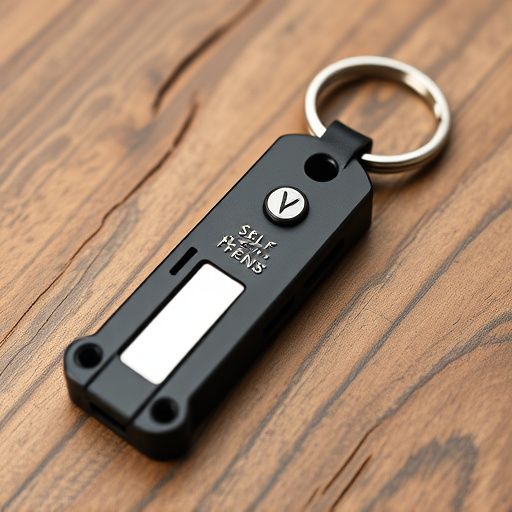Carrying a self-defense keychain for personal safety while walking requires understanding Self Defense Keychain Laws by State, as regulations differ widely. Some states allow them with reasonable belief of danger, while others impose force restrictions. Key factors in selection include sharp blades or stun features, compact size, ergonomic design, and strong build quality. Always check local laws regarding device type, size, power, and optional features like LED lights or noise makers to ensure legal carriage and responsible use.
Staying safe while walking is a top priority, and carrying a self-defense keyring could be a smart, legal, and effective solution. This comprehensive guide explores the world of self-defense keychains, providing insights into their growing popularity as personal protection tools. We’ll delve into state-specific laws regarding these compact devices, highlighting the benefits they offer and the essential features to look for. By understanding your rights and choices, you can make an informed decision about this handy self-defense accessory.
- Understanding Self-Defense Keychain Laws: A Comprehensive Overview
- The Benefits of Carrying a Personal Protection Tool on Your Keyring
- Choosing the Right Self-Defense Keychain: Features to Consider
- Navigating Legalities: What You Need to Know About Self-Defense Keychains by State
Understanding Self-Defense Keychain Laws: A Comprehensive Overview
Carrying a self-defense keychain can be a smart choice for personal safety while walking, but it’s crucial to understand the legal framework surrounding these tools in your state. The Self Defense Keychain Laws by State vary significantly, affecting what types of devices are legal and under what circumstances they can be used. Each state has its own definition of reasonable force, and what constitutes a lawful self-defense action.
For instance, some states explicitly allow the use of keychains designed for personal protection if an individual reasonably believes their life or property is in danger. However, others may have restrictions on the type of force that can be employed. Understanding these laws is vital to ensure you’re complying with your state’s regulations and using your self-defense keychain responsibly.
The Benefits of Carrying a Personal Protection Tool on Your Keyring
Carrying a personal protection tool on your keyring is a smart and practical decision, especially for those who enjoy walking alone or in remote areas. Unlike larger self-defense devices, a keychain tool offers discreet yet effective protection. Its compact size allows you to keep it readily accessible at all times, ensuring peace of mind during your walks. This small but mighty device can be a game-changer in potentially dangerous situations.
Knowing the Self Defense Keychain Laws by State is crucial for responsible carrying. Different states have varying regulations regarding personal defense tools, so understanding local laws is essential. Many states allow keychain weapons under specific conditions, such as for self-defense purposes only and with certain size or weight restrictions. Being informed about these laws enables you to legally carry your protection tool while respecting the regulations in place, ensuring a safe experience during your walks.
Choosing the Right Self-Defense Keychain: Features to Consider
When selecting a self-defense keychain, understanding your state’s self-defense keychain laws is paramount. These laws vary significantly from one state to another, so what’s legal in your state might not be in another. Features to look for include a sharp, durable blade capable of delivering a severe cut or stun feature that can temporarily incapacitate an attacker. Consider the size and weight; it should be compact enough to fit comfortably on your keychain without being cumbersome. Ergonomics are also key; ensure it’s easy to grip and control, especially in stressful situations.
Additionally, look for keychains with a strong build quality, as they will likely endure wear and tear during emergencies. Some models include features like LED flashlights or noise makers to startle attackers. Remember to check local laws regarding the use of these tools, even when they’re legally classified as self-defense devices in your state.
Navigating Legalities: What You Need to Know About Self-Defense Keychains by State
When considering a self-defense keychain as a personal protection tool for walking, it’s crucial to understand the legalities surrounding its use varies greatly by state. Each state in the US has its own set of laws and regulations regarding self-defense tools, including keychains designed for protection. What might be legal in one state could be strictly prohibited in another.
Navigating these Self Defense Keychain Laws by State requires diligence and research. Some states allow citizens to carry self-defense tools for personal protection without a permit, while others demand specific licensing or registration. Still, others have restrictions on the type, size, or power of the self-defense device permitted. Understanding your state’s laws is essential to ensure you’re not only legally carrying a self-defense keychain but also using it appropriately and within the boundaries set by your local jurisdiction.
In conclusion, a self-defense keychain can be an excellent addition for individuals prioritizing personal safety while walking. By understanding the legal framework around self-defense tools, including state-specific regulations covered in this article, you can make an informed decision about carrying a keychain as a protective measure. This compact and convenient option empowers users to feel more secure during their daily commutes, ensuring peace of mind in various environments. Remember, while a self-defense keychain offers added protection, staying vigilant and being aware of your surroundings is always the first line of defense.
